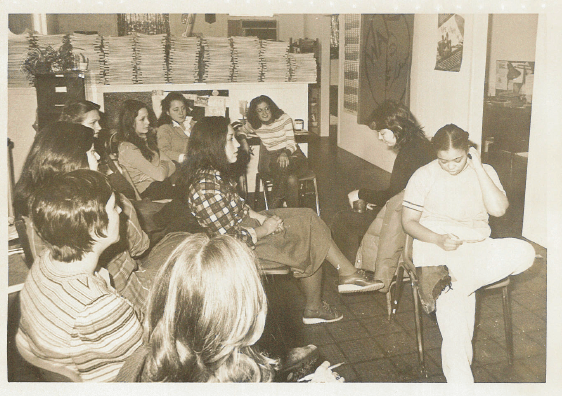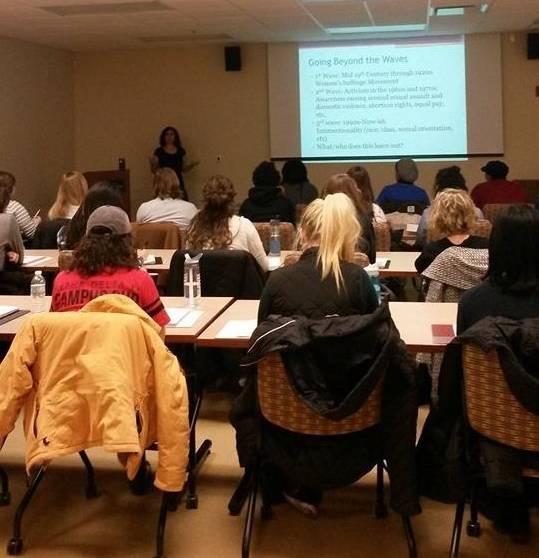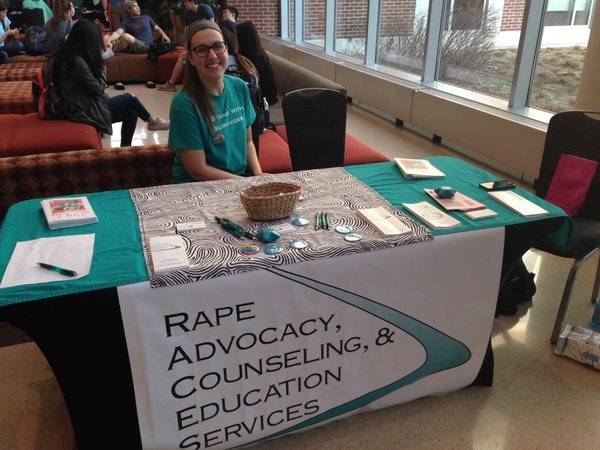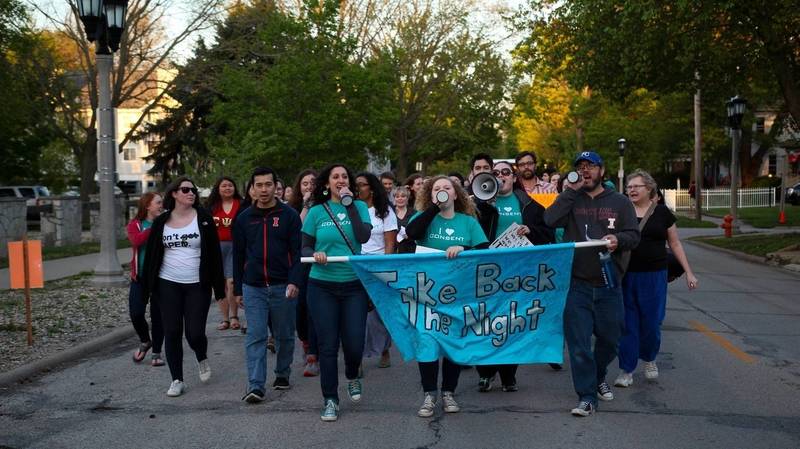April is Sexual Assault Awareness and Prevention Month. While sexual assault seems to be getting more attention than ever, violent sexual crimes continue to be pervasive within our society. Counseling and advocacy for victims, as well as community education and outreach are needed from the smallest town to the biggest city to help combat these crimes. In Champaign-Urbana, we are lucky enough to have an organization that provides all of these services for Champaign, Douglass, Ford, and Piatt counties. Rape Advocacy, Counseling and Education Services (RACES) provides the community with a number of free, in-person services with the assurance of confidentiality.
 RACES was founded in 2009 and is the daughter of Champaign-Urbana’s original rape crisis center that was formed in the early 1970s. An Urbana based organization, RACES provides critical support services for victims of sexual violence as well as their families and non-offending significant others. These services include: 1) a 24-hour Crisis Hotline, 2) Legal and Medical Advocacy, 3) Counseling, 4) Education. In doing so, RACES meets the four core requirements necessary to be designated as a sexual assault crisis center in Illinois. However, due to the Illinois budget crisis, RACES services are limited to the 24-hour Crisis Hotline and Medical Advocacy.
RACES was founded in 2009 and is the daughter of Champaign-Urbana’s original rape crisis center that was formed in the early 1970s. An Urbana based organization, RACES provides critical support services for victims of sexual violence as well as their families and non-offending significant others. These services include: 1) a 24-hour Crisis Hotline, 2) Legal and Medical Advocacy, 3) Counseling, 4) Education. In doing so, RACES meets the four core requirements necessary to be designated as a sexual assault crisis center in Illinois. However, due to the Illinois budget crisis, RACES services are limited to the 24-hour Crisis Hotline and Medical Advocacy.
The RACES 24-hour Crisis Hotline has been active in Champaign-Urbana since 1974 and is managed by trained staff and volunteers. Adelaide Aime, the Executive Director of RACES, estimates that over 200 individuals from Champaign, Douglass, Piatt and Ford counties reach out to the hotline every year. Across all of the calls Aime has taken there are three constants: fear, uncertainty, and a need for understanding. Even if victims have trusted individuals in their lives, the distress felt after rape and sexual assault can be very isolating. The crisis hotline is there for victims as often as they need it, whenever they need it. Through the hotline, RACES staff and volunteers provide support to victims in need of immediate assistance and refer them to RACES’ free counseling as a long-term support option.
 Another important resource for victims of sexual assault is advocacy. Victim advocates ensure confidentiality, provide emotional and informational support, and generally serve as a resource for victims of violent crimes. The specific role of an advocate can change depending the organization, type of violent crime, and the degree to which they are obligated to share information with law enforcement. The two types of advocacy performed by RACES volunteers (who undergo 40 hours of training to be able to perform their duties) are legal and medical advocacy.
Another important resource for victims of sexual assault is advocacy. Victim advocates ensure confidentiality, provide emotional and informational support, and generally serve as a resource for victims of violent crimes. The specific role of an advocate can change depending the organization, type of violent crime, and the degree to which they are obligated to share information with law enforcement. The two types of advocacy performed by RACES volunteers (who undergo 40 hours of training to be able to perform their duties) are legal and medical advocacy.
Legal advocates provide support for victims moving through the civil and criminal justice system. According to the RACES website, “This includes assistance in filing for Civil No Contact and Stalking No Contact Orders. They can also help you assert your rights as a crime victim and accompany you to meetings with officials and court hearings.” RACES medical advocates are available to be at area hospitals 24-hours a day in order to “accompany a victim through the evidence collection and medical treatment process; provide support; give information about options and rights; and assist with safety planning.” As one can imagine, the aftermath of sexual violence, if not handled properly, has the potential to be just as traumatic as the event itself. It is critical that victims have access to a variety of support systems and that that support comes from trained individuals as well as trusted friends and family.
In addition to advocacy, counseling is an important step towards achieving healing after sexual violence. Through RACES, victims have access to free, unlimited, and confidential counseling services. RACES serves victims and survivors as young as three years old, and also provides counseling to their families and non-offending significant others. For anyone who knows someone that has been sexually assaulted or raped Aime has some advice. “You don’t have to say the right thing, you just have to be there,” Aime encourages. By seeking counseling, friends and family can become better able to provide consistent and effective support.
 Access to a variety of support systems is obviously critical for victims of sexual assault and survivors of rape, but it is just as important to ensure that individuals within communities are educated about topics related to sexual violence. Beyond providing support to victims and survivors, RACES also works to provide community education and training for people ranging from preschool aged children to adult professional allies (school officials, law enforcement, medical professionals). Training for professional allies consists of recognizing and understanding the unique needs of victims. When RACES educators go to area classrooms they are use research based lessons on sexual assault, abuse, and harassment. Educators return to the classroom throughout the year to revisit and introduce new concepts in order to ensure retention. The techniques the educators used are often active and skit based.
Access to a variety of support systems is obviously critical for victims of sexual assault and survivors of rape, but it is just as important to ensure that individuals within communities are educated about topics related to sexual violence. Beyond providing support to victims and survivors, RACES also works to provide community education and training for people ranging from preschool aged children to adult professional allies (school officials, law enforcement, medical professionals). Training for professional allies consists of recognizing and understanding the unique needs of victims. When RACES educators go to area classrooms they are use research based lessons on sexual assault, abuse, and harassment. Educators return to the classroom throughout the year to revisit and introduce new concepts in order to ensure retention. The techniques the educators used are often active and skit based.
Teaching children about sexual assault, abuse, and harassment is all about framing, says Aime. It may seem like pre-school age is too young for children to learn about heavy topics like sexual assault and rape, but the idea is that by teaching children what healthy, positive relationships look like, they will be less likely to end up in unhealthy and unsafe situations later on. For example, preschool aged children are fascinated by secrets. To appeal to this interest, RACES instructors help children identify what healthy and unhealthy secrets look like, i.e. secrets can be fun, but shouldn’t be kept from your parents. Children are also taught to recognize sexual assault by being taught about personal privacy in ways they can understand. “Of course the only people who can prevent sexual assault are its perpetrators,” Aime acknowledges, “but if each of us is more involved in positive relationships, it can help us avoid dangerous situations.”
We have Sexual Assault Awareness and Prevention Month because we still have a long way to go as a society to effectively support victims and prevent these crimes. RACES provides critical services to achieve these goals to our community. However, it is also important to acknowledge achievement. Aime says she has seen immense progress in our society since she first began working as a social worker and became involved in helping victims/survivors 30 years ago. Aime is encouraged by changes she has seen in the way society looks at abusers who are famous and the inclusion of new topics for discussion in the realm of sexual violence such as incest, which she says was practically invisible 30 years ago. As a whole, Aime believes that our society is much more open to and knowledgeable about topics relating to sexual violence.
It’s critical that RACES be able to continue its work in Champaign, Douglas, Ford, and Piatt counties. Please consider donating to RACES via mail or online at their website. Donations to RACES are tax deductible.
To learn more about RACES, what they do, and get involved you can visit the RACES website.
For those interested in learning more about sexual violence and how to help victims the Rape, Abuse & Incest National Network (RAINN) is a good resource.
Information about sexual violence and laws pertaining to sexual violence in Illinois can be found with the Illinois Coalition Against Sexual Assault.
Victims of sexual assault can seek out help from RACES and other community resources.
For individuals who do not live in Champaign, Douglas, Ford, or Piatt counties, resources in your area can be found via the Illinois Coalition Against Sexual Assault.
Photos courtesy of RACES.








